Our dedicated colds page will look at:
Symptoms of a cold
Symptoms of a cold
Each child is different, but typical symptoms are:
Learn more
Symptoms of a cold
Symptoms of a cold
Each child is different, but typical symptoms are:
- Cough
- Stuffy or runny nose
- Sore throat (usually one of the first symptoms)
- Sneezing
- A hoarse voice
- General sense of feeling unwell
Some less common symptoms include:
- High temperature / fever (around 38–39°C)
- Headache
- Earache
- Aches and pains
- Red or irritated eyes
- Loss of taste and smell and a feeling of pressure in your ears and face
Symptoms usually last about a week, and for younger children can last up to 14 days.
How can I tell if my child has a cold or flu?
Sometimes it can be a bit difficult to tell the difference between whether your baby is suffering from a cold or flu. The main difference is that a flu can affect your child more quickly and is usually more severe. It affects more than the nose and throat, and they will likely feel exhausted.
Whereas, a cold takes longer to develop and can last around 7 - 14 days. It will affect mainly their nose and throat; however, your child should still feel okay to carry on as normal.
Cold
- Appears gradually
- Affects mainly the nose and throat
- Makes your little one feel unwell but okay to carry on day to day activities
Flu
- Appears rapidly (within hours)
- Affects more than just the nose and throat
- Makes your little one feel exhausted and not okay to carry on day to day activities
How can I tell if my child has a cold or allergies?
Dr Ellie Canon says: “An allergic reaction can sometimes seem like a cold, due to symptoms like sneezing, runny nose and coughing. That’s because the body responds to both colds and allergies by releasing chemicals (called histamines).
With allergies, the body overreacts to a harmless substance, called an allergen. When your child first comes into contact with an allergen, their body fights the allergen by producing antibodies. The next time your child comes into contact with the allergen, the body recognises it and releases chemicals such as histamine, which causes the physical symptoms.
Some symptoms commonly occur with an allergy and not with a cold, and vice versa. Look for these differences:
Cold
- Slow onset of symptoms (a few days for symptoms to appear after infection with virus)
- Symptoms typically last up to 14 days
- Often a sore throat
Allergy
- Symptoms can appear immediately after exposure to the allergen
- Symptoms can last days to months, as long as you’re are exposed to the allergen
- Sometimes a sore throat
Allergies may run in families and can be asthma- and eczema-related. If you think your child has an allergy, speak to your doctor. Try to keep track of your child’s symptoms, when and how often they happen, and if anything seems to trigger them.”
This content was written by healthcare professional Dr Ellie Canon in 2015. She was paid for her time but does not endorse CALPOL® Products.
Close
Causes of colds in children
Causes of colds in children
Dr Ellie Canon says: “More than 200 types of virus can cause the common cold so your child can have one cold right after getting over another, because each one is caused by a different virus.
Learn more
Causes of colds in children
Causes of colds in children
Dr Ellie Canon says: “More than 200 types of virus can cause the common cold so your child can have one cold right after getting over another, because each one is caused by a different virus.
A child typically has eight to ten colds a year, while an adult has only two to four. So, in comparison to you, it may seem like your child is sick all the time. A child can pick up colds from other children at playgroups, nurseries, and schools, or from siblings.
It’s normal for children and adults to get colds more often during the colder months. This is because it is an ideal environment for a cold virus to take hold. If your child is around a smoker, this can increase the likelihood of your child having many different upper respiratory problems, such as asthma, allergies, and colds.
Because a cold is caused by a viral infection, antibiotics (which are only effective against bacteria) don’t do any good.
Medicines can be used to ease the symptoms but will not get rid of your little one’s cold – their body will do this on its own.”
This content was written by healthcare professional Dr Ellie Canon in 2015. She was paid for her time but does not endorse CALPOL® Products.
How can you help prevent a cold from spreading?
Dr Ellie Canon says: “The common cold virus is spread by:
- Breathing in droplets of fluid containing the virus, such as when someone sick sneezes or coughs without covering their mouth.
- Touching something handled by a sick person and then touching your mouth, nose, or eyes. In general, a cold virus on an indoor surface is infectious for 24 hours.
Some tips to prevent a cold virus from spreading:
- Limit contact with someone that has a cold.
- Wash your hands frequently, and make sure your child and anyone around them do the same.
- Sneeze and cough into tissues and discard them immediately and wash your hands after. If you don’t have a tissue, cough into your sleeve.
- Do not share cups, cutlery, and so on.
- Use paper towels to dry your hands and face instead of shared towels.
- Clean surfaces regularly. It may also be a good idea to clean your child’s toys when they have a cold, especially after a play date.
Most people with a cold are contagious for about 1-2 weeks. You can be infectious a few days before the symptoms appear, up until the symptoms have finished. ”
This content was written by healthcare professional Dr Ellie Canon in 2015. She was paid for her time but does not endorse CALPOL® Products.
Close
Tips to help your child feel better
Tips to help your child feel better
Dr Ellie Canon says: “Many childhood illnesses, such as colds, get better without any treatment, but you can use certain remedies to ease their fever, pains and general discomfort. Over-the-counter treatments for the symptoms of a cold are available, even for infants and toddlers.
Learn more
Tips to help your child feel better
Tips to help your child feel better
Dr Ellie Canon says: “Many childhood illnesses, such as colds, get better without any treatment, but you can use certain remedies to ease their fever, pains and general discomfort. Over-the-counter treatments for the symptoms of a cold are available, even for infants and toddlers. If your child is distressed due to a fever, or if they have any pain, you could give them infant paracetamol or ibuprofen. Always ensure you use the age appropriate treatment, follow the instructions, and stick to the correct dosage.
There are also many other remedies you can try to help your child feel better again:
- Make sure your child has plenty of rest.
- To help them breathe more easily, massage some vapour rub - on their chest, or use a vapour plug-in (3+ months).
- Give them plenty of fluids (extra milk for babies) to prevent dehydration.
- Clear a stuffy nose with saline drops. You can also use a bulb syringe for babies. (All ages)
- The steam from a warm bath can help unblock congestion.
- Prop their head up in bed with extra pillows or towels so they can breathe more easily. (12+ months).
- If your child is over one year old, mix a little honey with lemon and some hot water to ease their cough. (12+ months)
What if my child’s cold seems serious?
In general, a cold should not keep you or your child from going about your normal routine. Cold symptoms usually last for about a week but get better over the period of a few days. The most common symptoms include sore throat, cough, stuffy or runny nose, and sneezing. Younger children and children with a cough can have symptoms that last up to two weeks. If you’re concerned, get in touch with your GP.”
This content was written by healthcare professional Dr Ellie Canon in 2015. She was paid for her time but does not endorse CALPOL® Products.
Close
When to see a doctor
When to see a doctor
You should contact your GP when:
Learn more
When to see a doctor
When to see a doctor
You should contact your GP when:
- Your baby is less than three months old and has a temperature of 38°C or above, or is between 3-6 months and has a temperature 39°C or above
- Their symptoms last more than 3 weeks
- Their symptoms are getting worse, rather than better
- They have difficulty breathing
- They have a severe earache
- They have persistent throat pain, or the pain seems unusually bad
- Other symptoms develop, like pain or swelling in face or chest, or a headache
- They have chest pain or are coughing up bloodstained phlegm
Close
At the moment it can be hard to know what to do if your child is unwell. It's important to trust your instincts and get medical help if you need it. If you think your child may be suffering from COVID-19 symptoms, visit the NHS website for further information.

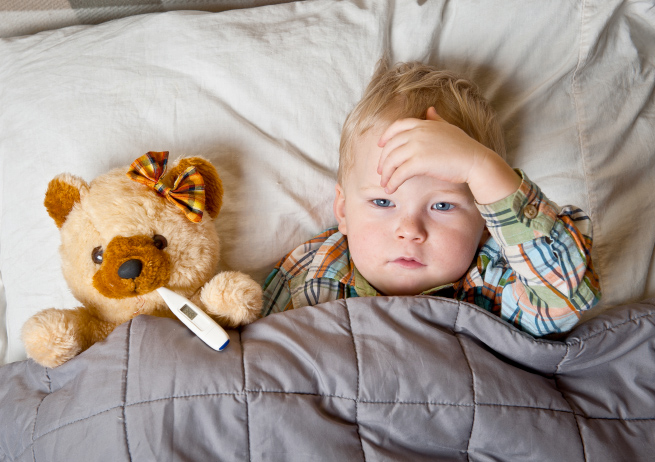
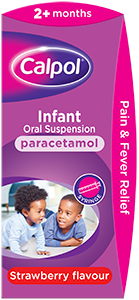
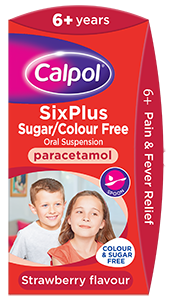
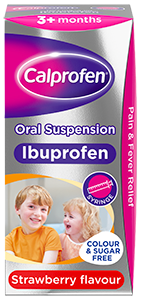
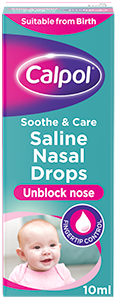

Dr Ellie Cannon is a practicing NHS GP, and works on public health campaigns including childhood health programmes. She is a mum of two, and has written a popular book on parenting 'Keep Calm, The New Mum's manual', which considers the physical and mental health of parents alongside baby care.
This HCP does not endorse Calpol.